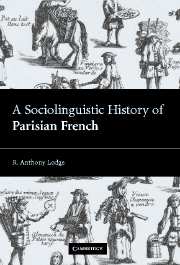Book contents
- Frontmatter
- Contents
- List of maps
- List of tables
- List of figures
- Acknowledgments
- List of phonetic symbols
- Part 1 Preliminaries
- Part 2 The pre-industrial city
- Part 3 The proto-industrial city
- 6 Social and sociolinguistic change, 1350–1750
- 7 Variation in the Renaissance city
- 8 Variation under the Ancien Régime
- 9 Salience and reallocation
- Part 4 The industrial city
- Conclusion
- Appendix Literary imitations of low-class speech
- Bibliography
- Index
6 - Social and sociolinguistic change, 1350–1750
Published online by Cambridge University Press: 22 September 2009
- Frontmatter
- Contents
- List of maps
- List of tables
- List of figures
- Acknowledgments
- List of phonetic symbols
- Part 1 Preliminaries
- Part 2 The pre-industrial city
- Part 3 The proto-industrial city
- 6 Social and sociolinguistic change, 1350–1750
- 7 Variation in the Renaissance city
- 8 Variation under the Ancien Régime
- 9 Salience and reallocation
- Part 4 The industrial city
- Conclusion
- Appendix Literary imitations of low-class speech
- Bibliography
- Index
Summary
Koinéisation in medieval times may have involved the emergence in Paris of a new, relatively stable mixture of dialect features, but it did not entail homogeneity, as we have seen. Persistent and often violent demographic fluctuation in the ‘proto-industrial period’ favoured more variation in language, not less. The first explicit moves to suppress such variation and establish a standard language come with the Renaissance, and it is the process of disentangling standard and vernacular in the speech of the early modern city which will provide the focus for Part 3.
In the fourteenth century, according to Hohenberg and Lees (1985), European cities entered a new stage of development, which lasted until the onset of industrialisation four hundred years later. The feature of proto-industrial development that impacts most on the sociolinguistic situation in Paris is an increase in hierarchical thought, which widens the gulf between the culture and life-style of the elites and those of the population at large. This is compounded in Renaissance Europe by the spread of literacy, which accentuates the divergence between the written culture of the elites and the traditional oral culture of the masses. A new polarity crystallises in the social psychology of the city, setting ‘urbanity’ against ‘rusticity’. In this new cultural setting, Latin is progressively restricted to its religious functions, and variation within the vernacular takes on a social importance that it appears not to have had previously.
- Type
- Chapter
- Information
- A Sociolinguistic History of Parisian French , pp. 105 - 123Publisher: Cambridge University PressPrint publication year: 2004



